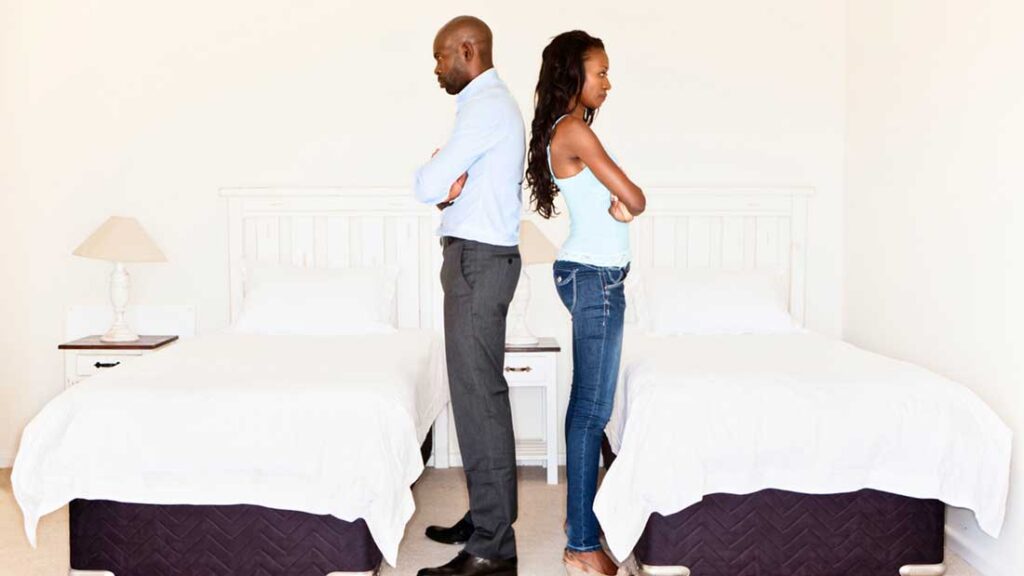
It might be all roses and sunshine and hand-holding in the daytime (or not), but at night, Americans are showing that things aren’t always perfect in the bedroom. According to a new survey by the American Academy of Sleep Medicine, one in three bed partners or couples is opting for a “sleep divorce.” You can probably quickly identify your partner’s most annoying nighttime habit, from stealing covers to snoring to scrolling on their phone at 3 a.m. when they can’t sleep. All these, and more, have led to one partner sleeping somewhere else in the house — for part of a night, or every night, depending on the couple.
The online survey included just over 2,000 adults in the U.S. in March, 2024, alongside Atomik Research, an independent agency. They sought to answer the question: “Do you ever do any of the following to adjust your sleep routine to accommodate a bed partner?” Then, they provided options such as using earplugs or an eye mask, sleeping in another room, adjusting bedtimes, and using a silent alarm. The results showed that it’s not uncommon for us to make some serious changes to deal with our partner’s sleep situation.
Overall, more than a third of respondents said they occasionally or consistently sleep in another room. In some cases, men are making more concessions than women — for example, 25 percent of men use a silent alarm to accommodate their partner, compared to just 8 percent of women. Around 1 in 10 participants are using either earplugs or eye masks. A significant number, 33 percent of couples, are adjusting bedtimes to accommodate each other.
But not all generations answered the questions the same. Though you might expect older respondents to have more issues with sleep, especially snoring, as they age, they were the least likely generation to adjust their sleep routine for their partner. In fact, 60 percent of Americans 55 – 64 did not. Millennials had higher reported use of earplugs and eye masks, along with silent alarms. Similar to Baby Boomers, Gen Z had a slightly lower rate of changing habits for partners, at just 28 percent.
Dr. Seema Khosla, pulmonologist and spokesperson for the AASM comments in the study’s release that though the term “sleep divorce” seems harsh, it simply means prioritizing sleep and moving to a more comfortable location for sleep when needed. Though it might seem unromantic, it turns out that it’s one of the best things you can do for your relationship. The results point to another study that shows that sleep deprivation can increase hostility in the relationship, so for those in the 70 percent of people sharing a bed, it can pay off to separate. Want to be an empathetic partner in the daytime? The researchers added that sleep loss decreases your ability to empathize with your partner, according to another study.
This new research adds to a body of existing research that doesn’t always agree — for example, a Naturepedic survey of 400 participants concluded that sleeping separately leads to better sleep, but overall people are less happy in those relationships. It also points to more specific and sometimes more emotionally driven reasons for not sleeping together, such as the 24 percent in their study citing intimacy issues, rather than just snoring, for example. They also narrowed down that after snoring, the second largest logistical reason for splitting at night is conflicting sleep and wake schedules, at 56 percent.
If you aren’t ready for a sleep divorce, you can also consider checking with your doctor about any sleep conditions that might be causing snoring, such as sleep apnea, or working with a couple’s therapist to get back to cuddling, if that’s your goal. Until then, invest in a comfy couch.
Sources
Stephanie J. Wilson, Lisa M. Jaremka, Christopher P. Fagundes, Rebecca Andridge, Juan Peng, William B. Malarkey, Diane Habash, Martha A. Belury, Janice K. Kiecolt-Glaser,
Shortened sleep fuels inflammatory responses to marital conflict: Emotion regulation matters, Psychoneuroendocrinology, Volume 79, 2017, Pages 74-83, ISSN 0306-4530, https://doi.org/10.1016/j.psyneuen.2017.02.015.Brown, C. L., Grimm, K. J., Wells, J. L., Hua, A. Y., & Levenson, R. W. (2023). Empathic Accuracy and Shared Depressive Symptoms in Close Relationships. Clinical Psychological Science, 11(3), 509–525. https://doi.org/10.1177/21677026221141852
American Academy of Sleep Medicine: “Over a third of Americans opt for a ‘sleep divorce’,” July 10, 2024, https://aasm.org/over-a-third-americans-opt-sleep-divorce/.


























